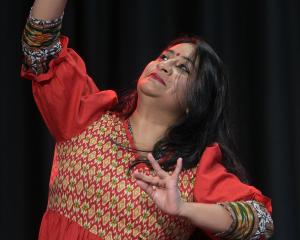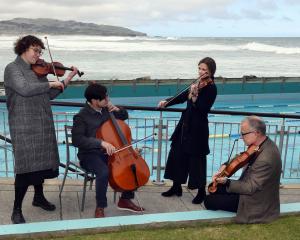Tension, drama, jealousy, romance, war, spirituality and kings and chiefs make for a great story. Anthony Ritchie and Michelanne Forster's new opera This Other Eden, about events 200 years ago, has its world premiere in Arts Festival Dunedin next month. Charmian Smith reports.
When a particular story spins off music, artworks, books, plays, poetry and even a lecture series, you know that story has legs, says Michelanne Forster.
The Auckland-based playwright was fascinated by the story of Thomas Kendall, a missionary and one of the first Pakeha to live permanently in New Zealand.
He created the first Maori-English dictionary and grammar, was fascinated by Maori cosmology, took a Maori wife despite already having a Pakeha wife and six children, dealt in muskets, and was finally dismissed from the Church Missionary Society.
Forster considers the Kendall story seminal as it's about the bridge between Maori and Pakeha at the very start of our relationship together 200 years ago, and she's certain there will be many new works inspired by the story over the next 200 years.
She researched and wrote a play, This Other Eden, about Kendall in 1995 when she was writer in residence at Canterbury University, and it was staged the following year at the Court Theatre.
''I hoped some other theatre companies would be interested in doing it but it didn't happen so I kind of put it in a drawer. It wasn't until I met Anthony in about 2006 and someone had said to me that he's always interested in a good story that it just clicked. I do have the perfect story so I told Anthony and it went from there,'' she said.
''I'd always wanted to write an opera libretto and I was a great fan of Anthony's work. I was rather chuffed that he wanted to work with me.''
Anthony Ritchie said he'd been impressed by Forster's work such as Daughters of Heaven and Larnach - Castle of Lies, so was keen to look at the Kendall story.
Forster converted the play into the libretto, reconceiving it so it is framed by Jane Kendall looking back on her journey to New Zealand and what happened to her here.
''As I become older, I become more interested in the silent participants in New Zealand history and they are women. It's usually men who are in the New Zealand Dictionary of Biography and the websites. I think, what about their wives and their mistresses and their servants and their mothers and all those people?''
Little is known about Jane Kendall, except she came to New Zealand with Kendall and their five children and had four more here.
''I think the point of writing from history, you do have to master the facts but you have to move on from there to something dramatically worthwhile, and not get caught up in what really did or didn't happen. That's the historian's job,'' she said.
The playscript needed to be cut by about half for the libretto and rewritten so the words were easy to sing and could be set to music. There were already poetic soliloquies in the play which could be turned into arias.
Ritchie and Forster also created a chorus of 12 for the opera. Because they realised funding wouldn't be available for large choruses of missionaries and Maori, they determined on one that was rather like the chorus in ancient Greek plays.
''Sometimes they are missionaries, sometimes they are Maori, sometimes they are like storytellers. This little band of people can be everyone as needed: onlookers, bystanders, in the action, commenting on the action, and when you need servants, when they go to London and Hongi Hika and Waikato are presented to King George IV, it works very well to have members of the chorus dressed as servants,'' she said.
Kendall was a born-again Christian who persuaded the Church Missionary Society and Samuel Marsden to send him to New Zealand.
He arrived at Rangihoua in the Bay of Islands with Jane and their children in 1814, and helped establish the first permanent Pakeha settlement under the patronage of Nga Puhi chief Hongi Hika.
He was to set up a school and create the first dictionary of Maori language, according to Prof Ritchie.
''Kendall was by all accounts an idealistic man who wasn't always grounded in reality. He developed strange theories that the Maori's ancestors were Egyptians or the lost tribe of Israel and so on. Nevertheless a lot of the information he did gather was valuable and in 1820 he brought his dictionary of Maori grammar and vocabulary back to England to present it to King George. He was accompanied by the Maori chief."
See it
The world premiere of This Other Eden, by Anthony Ritchie and Michelanne Forster, is at the Mayfair Theatre on October 10. There are four performances.












